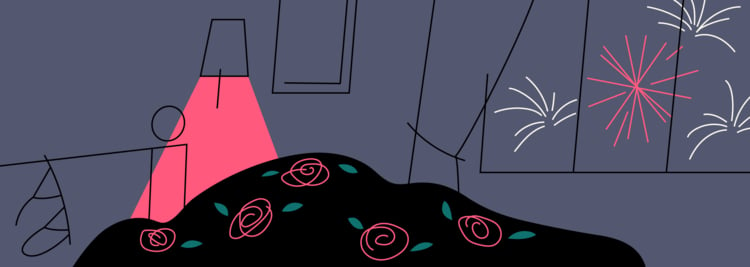A hysterectomy (surgical removal of the uterus) is unlikely to affect sexual function. To learn more about what to expect from your sex life after a hysterectomy, keep reading.
-
Tracking cycle
-
Getting pregnant
-
Pregnancy
-
Help Center
-
Flo for Partners
-
Anonymous Mode
-
Flo app reviews
-
Flo Premium New
-
Secret Chats New
-
Symptom Checker New
-
Your cycle
-
Health 360°
-
Getting pregnant
-
Pregnancy
-
Being a mom
-
LGBTQ+
-
Quizzes
-
Ovulation calculator
-
hCG calculator
-
Pregnancy test calculator
-
Menstrual cycle calculator
-
Period calculator
-
Implantation calculator
-
Pregnancy weeks to months calculator
-
Pregnancy due date calculator
-
IVF and FET due date calculator
-
Due date calculator by ultrasound
-
Medical Affairs
-
Science & Research
-
Pass It On Project New
-
Privacy Portal
-
Press Center
-
Flo Accuracy
-
Careers
-
Contact Us
Are Orgasms After a Hysterectomy Possible? All Post-Op Sex Questions Answered by Flo


Every piece of content at Flo Health adheres to the highest editorial standards for language, style, and medical accuracy. To learn what we do to deliver the best health and lifestyle insights to you, check out our content review principles.
Key facts about hysterectomy
A hysterectomy is a surgical procedure that involves the removal of your uterus. It is one of the most common surgeries performed on women, and it is more frequent in women between 40 and 50 years old.
You may need a hysterectomy to treat health conditions that affect your reproductive system. Some of the health conditions that may need hysterectomy include:
- Uterine fibroids (one of the most common causes for hysterectomy)
- Problems with pelvic support (for instance, uterine prolapse)
- Endometriosis
- Abnormal bleeding from the uterus
- Cancer of the reproductive organs
- Chronic pain in the pelvic region caused by endometriosis, unsuccessfully treated pelvic inflammatory disease, or adenomyosis or fibroids
There are various kinds of hysterectomy:
- In a total hysterectomy, the doctor removes the entire uterus along with the cervix.
- In a partial (or subtotal) hysterectomy, the doctor removes the upper region of your uterus, leaving the cervix in place.
- In a total hysterectomy with bilateral salpingo-oophorectomy, the doctor removes the uterus and cervix along with the fallopian tubes and ovaries.
- In a radical hysterectomy, the doctor removes the uterus along with the structures present around it, including your fallopian tubes, ovaries, some part of the vagina, fatty tissues, and lymph glands. It is often done if there is a suspicion or diagnosis of cancer.
The surgeon may perform the hysterectomy in various ways including with laparoscopy, through the abdomen or vagina.
How long should you wait before having sex?
Your doctor will advise you to wait about four to six weeks before having sex after a hysterectomy. This allows the scar from the surgery to heal properly and any vaginal bleeding or discharge to stop.
If you feel that you aren’t ready to have sex after six weeks, then don’t worry. Each person is different and needs a different amount of time before they’re ready for sex.
Your doctor will advise you to wait about four to six weeks before having sex after a hysterectomy.
Take a quiz
Find out what you can do with our Health Assistant
If you experience bleeding after having sexual intercourse after a hysterectomy, you should visit a physician to find out the cause. They may offer you treatment and check that the wounds are healing properly.
What are the physical changes after a hysterectomy?
Here’s what to expect after a laparoscopic hysterectomy. You may have slight pain during the initial few days after surgery. Your doctor will give you medicine to relieve the pain. You may also experience vaginal bleeding and discharge for a few weeks that requires using pads.
If the doctor removes your ovaries during the hysterectomy procedure, you will undergo immediate surgical menopause, no matter how old you are. In such cases, your doctor may offer you hormone replacement therapy.
You may have slight pain during the initial few days after surgery. Your doctor will give you medicine to relieve the pain.
Even if one or both of your ovaries are left intact, they could fail within five years after having your hysterectomy. This is because ovaries receive some of their blood supply through the uterus, which is removed during the operation.
Sex drive after hysterectomy: does it change?
Many women’s sexual desire or libido reduces initially after a hysterectomy, but it returns once full recovery happens.
Furthermore, according to studies, there may be an improvement in your libido, sexual activity, and the power of your orgasm after a hysterectomy.
If you lose your interest in sexual activity after the surgery, you and your partner can discuss it to prevent it from becoming a silent issue between yourselves. You can also discuss it with your doctor or a counselor who specializes in dealing with sexual issues.
If you lose your interest in sexual activity after the surgery, you and your partner can discuss it to prevent it from becoming a silent issue between yourselves.
Loss of sex drive after a hysterectomy can get worse because of stress and relationship problems, depression, and, potentially, menopausal symptoms. Though these problems often resolve after some time, if symptoms and signs of depression and menopause persist, talk to your doctor about it. Treating symptoms of menopause may indirectly enhance your libido by improving your energy levels and general health.

Your mental health is important
Our built-in Health Assistant will help you understand your symptoms and look after your mental health.
Orgasms after hysterectomy: are they possible?

Having a hysterectomy doesn’t mean that you won’t be able to have an orgasm while having sex. Your labia and clitoris are still intact, and they are very sensitive.
The role of the cervix in an orgasm isn’t known. According to some experts, removing your cervix may have a negative effect, while others have a different view.
A review of studies comparing total and subtotal hysterectomies in premenopausal women found that sexual function was affected similarly in both types. In some women, sexual sensation was reduced. Symptoms included vaginal dryness after hysterectomy, reduced sensation upon vaginal penetration, and less strong orgasms.
If your sex life was good before the hysterectomy, then you’re more likely to maintain it after the surgery.
If you had distinct contractions of your uterus during orgasm before you had a hysterectomy, then you may not have these after the surgery.
If your sex life was good before the hysterectomy, then you’re more likely to maintain it after the surgery. For some women, their sex drive improves after hysterectomy. This may be because they get relief from the symptoms of heavy bleeding or chronic pain that were associated with the uterine problem.
Possible complications after a hysterectomy
Hysterectomies are among the safest reproductive surgical procedures. However, just like with any other surgery, some possible complications can occur, including:
- Infection and fever
- Heavy bleeding after or during surgery
- Injury to the organs near the uterus or urinary tract
- Formation of blood clots in your leg, which may move to the lungs
- Heart or breathing problems associated with anesthesia
You may have to stay in the hospital for a few days after a hysterectomy. The duration of your stay depends on the kind of hysterectomy surgery you had along with the technique used to do it. You should start walking as soon as possible after the surgery to help prevent blood clots in your legs. Your doctor may also give you medicine to prevent blood clots.
Here are some of the temporary adverse effects of a hysterectomy.
Bladder and bowel disturbances
Some women develop constipation or urinary tract infections after surgery. You can manage both these conditions easily. It’s a good idea to increase your intake of fiber and fruits. Drink lots of fluids to help with bladder and bowel movements.
Discharge from the vagina
You may experience some discharge and vaginal bleeding after a hysterectomy, which may last for about six weeks. Talk to your doctor if you develop heavy vaginal bleeding, have strong-smelling vaginal discharge, or pass blood clots.
Menopausal symptoms
If your ovaries are removed, you may experience symptoms of menopause after the surgery, including:
- Hot flashes
- Weepiness
- Anxiety
- Sweating
Your doctor may give you hormone replacement therapy to manage these symptoms.
Emotional side effects
You may develop a sensation of sadness and loss after a hysterectomy. The sense of loss is more common in women who wanted to conceive in the future because you can’t get pregnant after a hysterectomy.
Talk to your doctor if you develop symptoms of depression that don’t get better. They can give you advice about treatment options.
Other women may develop the feeling of being less womanly. You may develop symptoms of depression after the surgery. Talk to your doctor if you develop symptoms of depression that don’t get better. They can give you advice about treatment options.
Tips for better sex after the operation
Here are some tips to improve your sex drive after a hysterectomy:
- Be physically active. Being active physically may help lift your mood, boost your energy levels, and improve your body image. This can help improve your sex life after a hysterectomy.
- Avoid smoking. Smoking cigarettes can reduce the flow of blood to your vagina and also decrease the effects of the hormone estrogen. This can make sexual arousal more difficult.
- Avoid alcohol and drugs. These may slow down your body’s responses.
- Have sex more frequently. This helps increase the flow of blood to your vagina and keeps the tissues healthy.
- Do exercises to strengthen your pelvic floor. Exercises that strengthen your pelvic floor help increase the flow of blood to your vagina and strengthen the muscles engaged when you orgasm.
- Take some time to get aroused before having sex. During arousal, moisture is released in the vagina that helps protect the tissues and also makes sex comfortable. You can also use a lubricant (water-based) to help with vaginal dryness after a hysterectomy.
- Avoid using products that may irritate your vagina. Strong soaps and bubble baths can irritate your vagina. Visit your doctor if you develop vaginal irritation or itching as it may indicate an infection.
- Talk to your doctor about products that claim to increase your sex drive. Some women use products such as creams or pills containing the hormone testosterone. These products aren’t approved by the Food and Drug Administration to treat low sex drive in women, though. Be sure to talk to your doctor about the risks and benefits of taking these drugs.
A final note about life after a hysterectomy
A hysterectomy may permanently change certain parts of your life. Your periods will stop, you won’t get pregnant, and you may experience symptoms of menopause. Additionally, the symptoms you were experiencing before the surgery may get better. If your sex life was good before the surgery, you will likely maintain it post-surgery too. Thanks to the relief from uterine symptoms that the surgery addressed, you may even experience a better sex life after a hysterectomy.


Hey, I'm Anique
I started using Flo app to track my period and ovulation because we wanted to have a baby.


The Flo app helped me learn about my body and spot ovulation signs during our conception journey.


I vividly
remember the day
that we switched
Flo into
Pregnancy Mode — it was
such a special
moment.
Real stories, real results
Learn how the Flo app became an amazing cheerleader for us on our conception journey.




